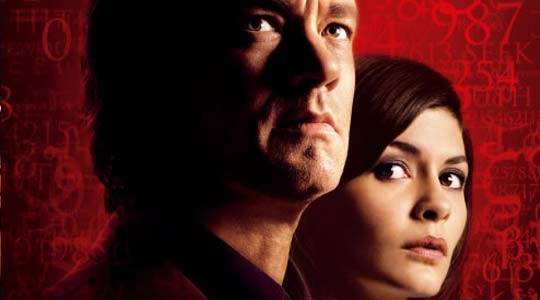
A retired English teacher approached me last week at Sacred Heart Parish in Covina, CA after I gave a presentation on The Da Vinci Code. She spoke to me in that quiet tone of disappointment used by English teachers and said, “What I regret the most about The Da Vinci Code is that it gives us no heroes.”
Alas, even with such high production qualities, an A-list cast, and the character of Sir Leigh Teabing (Ian McKellan) spouting off about heroes, Ron Howard’s cinematic interpretation of Dan Brown’s best-selling novel The Da Vinci Code, does not offer us moral greatness or heroes.
The film is a suspenseful road trip spanning two days (without any sleep) from Paris, to the Vatican, to England and Scotland that brings to a head an intricate age-old conspiracy about the identity of the Holy Grail, a secret worth killing for, according to Leigh Teabing. “Witness”, he tells the main characters Professor Robert Langdon (Tom Hanks) and police cryptologist Sophie Neveu (Audrey Tautou) when they appear at his home looking for explanations, “the biggest cover-up in human history.”
Plot Points
It is useful toframe The Da Vinci Code in three acts to grasp the premise and the twists and turns of this fictional tale:
Ø Act One: Jesus was married to Mary Magdalene, the Holy Grail c. 33 AD; they had a daughter; their blood line (and identity as the Holy Grail) continues to this day.
Ø Act Two: Since the beginning of the Church, Peter and supposedly the apostles, conspired to keep this a secret so that men could rule the Church; the Priory of Sion and the Knights Templar were founded in the 12th century to find the key to the lost Grail and preserve the secret; and Opus Dei in the 20th and 21st century continue the conspiracy in order to secure the male leadership and domination of the Church and hide the divine feminine.
Ø Act Three: (in three parts): Present day: 1) all the members of the Priory are murdered, as 2) a bishop of Opus Dei strives to keep the lid on, and 3) Da Vinci’s Mona Lisa and The Last Supper provide the clues that finally reveal the conspiracy and the current identity of the Holy Grail today which could change the course of history if known outside the inner circle.
The Theology of the Book & the Movie
In order for Dan Brown’s premise to work, that Jesus and Mary Magdalene were married and had a daughter and that their blood line continues is divine, the Christian believer must suspend any belief in the divinity of Jesus. Dan Brown does so in the book by debunking Jesus’ resurrection from the dead; Academy Award winning screenwriter Akiva Goldsman (A Beautiful Mind, Cinderella Man) does so by ignoring the resurrection of Jesus entirely and repeating over and over that Jesus was only a man. This subtle shift between the book and the film is not immediately noticeable; at first it seems that Mary Magdalene is depicted as the Holy Grail, the womb that bore Jesus’ child and not a lowly cup that held the wine he transformed into his blood at the Last Supper. Yet as the film continues, it recounts Mary Magdalene’s escape from Jerusalem, pregnant with Jesus’ child, as he dies on the cross never to be heard from again. The film is concerned with Mary Magdalene’s many and varied burial places, never that of Jesus, who if he did not rise from the dead must have been buried somewhere. Jesus merits little attention in the film except as the father of Mary Magdalene’s child – and the reason for Bishop Aringarosa’s and Silas’ weird and murderous behavior. In fact, Mary Magdalene herself is actually the divine one. According to Teabing in the film, her purpose is to save the oppressed and the poor.
In both the book and the film the key to the conspiracy and the de-divinization of Jesus is Teabing’s prolonged rhetorical explanation of the conspiracy to Langdon and Sophie, as Barbara Murphy explores in her analytical article “Sir Leigh Teabing’s Jesus in The Da Vinci Code” He does away with the authenticity of the four Gospels and Scripture and replaces these with Gnostic texts that emerged later than the Gospels. Among other things, Gnosticism believed that God the Father, an immaterial being and therefore good, created Jesus, a material being, and therefore evil because all matter was considered evil. Gnostic texts were never accepted as revelation by the early Church.
The Fonts of Divine Revelation
How does the average Catholic know with certainty that the Gospels are authentic and divinely inspired? How do we know that the content of the Apostles’ Creed and the Nicene Creed (formulated by the Council of Nicea in 325AD) that we pray at Sunday Mass together are true?
Although The Da Vinci Code makes it seem that there is no historical proof to anything Christians believe, a review of the fonts of divine revelation and Church history can reassure us.
Divine Revelation is God’s communication to us about himself, ourselves, and God’s plan for us, made known to us through Sacred Scripture and Sacred Tradition – the two fonts of Divine Revelation.
Sacred Scripture is the Word of God and the Bible is the book that contains it. The Bible consists of the Old Testament (46 books) and New Testament (27 books, including the four Gospels). The Church believes these are divinely inspired. The canon of the New Testament was formed by the year 220; St. Justin Martyr and other Fathers of the Church were quoting from the Gospels as we have them now by the year 150AD.
The Basic Catechism (Pauline Books & Media; 1999), based on the Catechism of the Catholic Church (1994), explains that “Sacred Tradition is the process by which the Church, through the assistance of the Holy Spirit, preserves and hands on to all generations, in its teaching, life, and worship, all that it is and believes.” It is the teaching authority of the Pope, the Vicar of Christ and the successor of St. Peter, who in an unbroken line of “apostolic succession” that is historically verifiable, preserves and helps the Church grow in its understanding of the “heritage or deposit of faith.”
The Film
As a film, I found The Da Vinci Code to be suspenseful and a good watch. The cinematography is admirable. Ron Howard is an excellent director and though he was not able to tell this story with absolute clarity, nonetheless, it’s a better-than-average thriller, including murder and mayhem – and of course, the Vatican. (The Vatican is everywhere these days and is a “character” in The Da Vinci Code, Mission: Impossible III and in the upcoming remake of The Omen.)
One of the problems with the film is that the conspiracy is everything. There is no character development so everyone comes off as rather shallow. There are plenty of bad guys – and they are all members of the Catholic Church that is fronted by Opus Dei, a real religious congregation-like organization approved by theCatholic Church to spread the Gospel. Unfortunately, like the Jesuits before them, members of Opus Dei and the institute itself, make a very large target for the imagination of writers and filmmakers.
Another problem is that the double-stranded inner logic of the film is not integrated. The narrative component does have a beginning, middle, and an end as do most stories. What is illogical and inconsistent is exactly what the characters mean by what they say – and they say a lot. The plot is so full of holes that it takes a leap of faith to believe Teabing’s parallel feminine divinity tale, and he does not believe in faith. In truth, The Da Vinci Code is a fiction. The film’s tag line says: Seek the truth. Good idea.
The biggest difficulty with this story that purports to be “religious” is that there is no transcendence and no – love. Goodness is supposedly found in the feminine divine in the film’s mythology, but the idea is preserved by mostly dead white men. Therefore, I wonder if Dan Brown actually has a point of view about women in the Church and the world or just a good, albeit almost incoherent, storyline?
At the end of the day, without any examples of unconditional love that lays down its life for another, male and female, there is no relationship with God in the story, no reason for the characters to get up in the morning - and certainly no heroes.
A Pastoral Approach to The Da Vinci Code
The Da Vinci Code, book and movie, is entertainment media, and therefore, it’s about big business and will probably produce enough profit to support a small country. Entertainment media are part of our capitalist economic system that has no religion and comes with an ethical framework that is almost non-existent. Millions of people have read the book and will see the movie, and people are talking about it.
I think there are several things we can do as Catholic Christians regarding this cultural phenomenon:
• Be informed about your Catholic faith; read the New Testament and a good book on Church history; find out what each phrase of the Creed means
• Listen to others when they want to talk about The Da Vinci Code; let them finish their thought before jumping in; enter into respectful dialogue
• If you don’t know the answer, find out
• Avoid being defensive
• Respond rather than react
• Build a bridge of understanding
• Think of the film as a table around which we can gather to converse about Jesus
• Don’t talk authoritatively about something you haven’t seen or read: Maybe: “I didn’t see it/read it yet; but what did you think?”
Jesus said in John 10:10: “I came that you may have life and have it to the full” and in Mark 16:15: “Go out into the whole world and preach the Gospel to all creation.” But the bestis from John 6:20 “It is I; do not be afraid.” No one in The Da Vinci Code ever says this.







